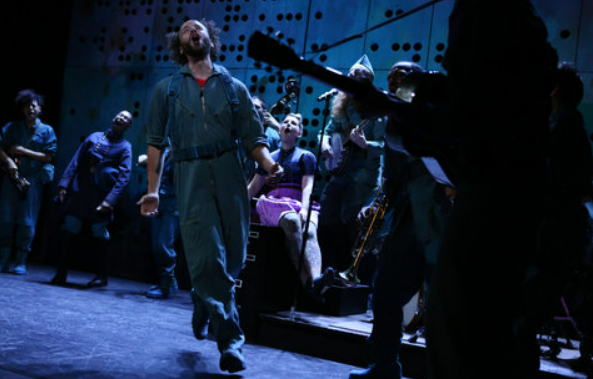
埃里克·法伯(Eric Farber)在康奈利剧院(Connelly Theatre)的“未来”(Futurity)中。信用朱丽叶 塞万提斯
Toby Berggruen, age 15
Imagine a man born in the Civil War who lives to see the first men walk on the moon in 1969. A fictional correspondence between a Union soldier and the first computer scientist. A steam-powered brain that brings world peace. That is the challenge of the play “Futurity,” a strange alchemy of music, history, fiction and philosophy. The premise may be absurd but the questions are urgent and real, as pressing today as they were in the 1860s.
Presented at the intimate Connelly Theater on the Lower East Side, this co-production between the Soho Rep and Ars Nova opens in the thick of the Civil War. “Futurity” tells the story of Julian Munro, a fictional soldier portrayed by its creator, César Alvarez. Through Munro, we delve into the brutal realities of wartime America, and the prescient imagination of a lone soldier. Finding himself in the midst of a world abound with pain and suffering, Munro begins to imagine a solution to human conflict, a mechanical machine that will bridge the humanities and sciences, accomplishing world peace. In his search, he begins a correspondence with Ada Lovelace, a remarkable mathematician played by the forceful, exuberant Sammy Tunis. The sagacious brilliance of Lovelace seamlessly meshes with the idealist Munro, who exudes hope and creative energy. The two grapple with issues both personal and universal as they embark on a journey into an opaque realm of invention and morality.
Mr. Alvarez deserves much praise for his impassioned performance; his display showcases wit, confidence and rich voice. The play’s music combines powerful folk song with the edge and nonconformity of a David Byrne song. Its lyrics are themselves masterful — aphoristic, poignant and true — profuse with existential questions such as, “Is morality made of information?” Directed by Sarah Benson, all aspects of “Futurity” mesh together with ease and intensity, combining effortless choreography and rich set design.
“Futurity” asks questions, questions that make us think deeply about who we really are. They are certainly too vast to list, but one question keeps ringing in my mind: How to solve unsolvable problems? Is it possible to solve the unspeakable evil of our world? How? Through a synthesis of the perfection of the mathematical world and the depths of art, as “Futurity” suggests? As the General touchingly reminds us, “I believe that this body is all I have, and that it’ll take more than a war to make it safe.” What will it take to solve racial inequality? Not just a war. “Futurity” combines a vast plethora of subjects with sensitivity and depth, from art, to science, to philosophy. It directly tackles notions of morality, time and singularity — to name a few — and leaves us asking more questions than it answers.